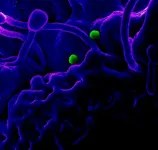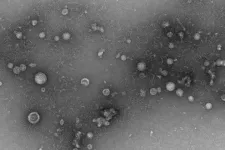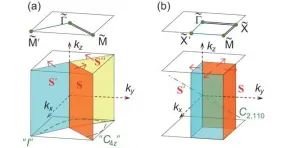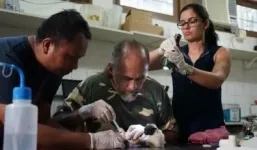(Press-News.org) A new research study out of the University of Nevada, Reno's School of Community Health Sciences has just been published by the American Journal of Public Health and addresses state preemption of local sugar-sweetened beverage (SSB) taxes, issuing an emerging public health threat. Assistant Professor Eric Crosbie examines commercial determinants of health and public health policy, specifically in industries like tobacco and food and beverage.
"The beverage industry is aggressively attempting to preempt sugar-sweetened beverage taxes at the state level to prevent the diffusion of progressive policies at the local level throughout the United States," Crosbie, an affiliate of the University's Ozmen Institute for Global Studies, said. "Once preemption laws are enacted, they create a chilling effect that severely cripples local progress and are challenging to repeal."
Sugar-sweetened beverages, which include calorically sweetened sodas, energy and sports drinks, coffees, teas and fruit drinks, are the primary source of added sugars in the U.S. diet, increasing the risk of cardiometabolic diseases.
Between 2014 and 2017, excise taxes on SSBs were enacted by the Navajo Nation and seven U.S. cities (Albany, California; Berkeley, California; Boulder, Colorado; Oakland, California; Philadelphia, Pennsylvania; San Francisco, California; and Seattle, Washington). Washington D.C. enacted an SSB sales tax, but since 2017, political momentum has stalled due to beverage industry opposition.
Central to beverage industry opposition is the strategy of state preemption, which occurs when a higher level of government - like the state - limits the authority of lower levels - like municipalities - to enact laws.
Crosbie's research, supported by the University, shows that since 2017, Arizona, California, Michigan and Washington states have passed laws preempting local SSB tax policies, and in three of these states, it took an average of only 29 days from the policy's introduction to its passage: Arizona (46 days), California (5 days), and Michigan (37 days). Since 2017, four states - Illinois, New Mexico, Oregon and Pennsylvania - had policymakers withdraw preemption proposals or had them rejected by voters but only after strong opposition.
"The beverage industry has aggressively financed marketing campaigns, ballot initiatives and political representatives to secure preemption," Crosbie said. "Between 2016 and 2018, the beverage industry has spent at least $50 million on state preemption attempts in eight states."
While the beverage industry's use of state preemption to halt diffusion in local soda taxes is still in its early stages, the beverage industry uses time-tested strategies cultivated by the tobacco industry.
"Public health opposition to SSB tax preemption to date generally uses tactics that mirror those successfully pioneered by tobacco control advocates," Crosbie said. "Findings from this research point to the need for a robust national network of advocates, supported by national panels of legal experts, that can shift from a reactive to a proactive approach that halts the spread of preemption and begins the task of overturning existing statues."
Since 2000, state preemption limits local plastic bag laws, LGBTQ+ rights, minimum wage and local efforts to control the spread of COVID19 (e.g., through business closures).
Crosbie has both local and international experience collaborating with health organizations and health advocates to educate and disseminate academic research findings to policymakers, including publishing research in Spanish to reach wider audiences. Overall, his research is multi-disciplinary combining elements of public health, political science, international relations, economics, law and business to examine public health policy both locally and globally.
Learn more about an online Master of Public Health degree from the University of Nevada, Reno, helping graduates gain the knowledge needed to help benefit the public health community.
INFORMATION:
There is growing evidence that ketone bodies may be beneficial to heart disease patients regardless of the method of delivery used to increase ketone delivery to the heart. A Journal of the American College of Cardiology review paper examines emerging evidence regarding ketone bodies' effects on the heart and the potential for ketone therapy as a cardiovascular intervention in heart disease patients.
In recent years ketone bodies entered the popular lexicon through the "keto diet," which consists of a very low carbohydrate and high fat diet that endeavors to force the body into ketosis. This is a metabolic ...
WHAT:
A randomized, placebo-controlled Phase 1 clinical trial of two monoclonal antibodies (mAbs) directed against the coronavirus that causes Middle East respiratory syndrome (MERS) found that they were well tolerated and generally safe when administered simultaneously to healthy adults. The experimental mAbs, REGN3048 and REGN3051, target the MERS coronavirus (MERS CoV) spike protein used by the virus to attach to and infect target cells. The mAbs were discovered and developed by scientists at the biopharmaceutical company Regeneron, located in Tarrytown, New York. The trial was sponsored by the National Institute of Allergy and Infectious Diseases (NIAID), part of the National Institutes of Health.
The trial was the first to test the experimental antibodies
Hyperlink Code ...
Inflammatory lung diseases such as asthma, COPD and, most recently, COVID-19, have proven difficult to treat. Current therapies reduce symptoms and do little to stop such diseases from continuing to damage the lungs. Much research into treating chronic inflammatory diseases has focused on blocking chemicals called cytokines, which trigger cascades of molecular events that fuel damaging inflammation.
Now, scientists at Washington University School of Medicine in St. Louis have found that such cytokines can drive inflammation in more ways than previously understood, perhaps revealing new routes ...
Using the symmetries of the systems, people can define various topological invariants to describe different topological states. The topological materials can be accurately discovered by calculating the topological invariants. Recently, researchers found that irreducible representations and compatibility relationships can be used to determine whether a material is topological nontrivial/trivial insulator (satisfying the compatibility relations) or topological semimetal (violating the compatibility relations), which leads to a large number of topological materials predicted by theoretical calculations. However, Weyl semimetals go beyond this paradigm because the existence of Weyl fermions does not need any symmetry protections (except for lattice translation symmetries). At present, ...
Urban areas are on the rise and changing rapidly in form and function, with spillover effects on virtually all areas of the Earth. The UN estimates that by 2050, 68% of the world's population will reside in urban areas. In the inaugural issue of npj Urban Sustainability, a new Nature Partner Journal out today, a team of leading urban ecologists outlines a practical checklist to guide interventions, strategies, and research that better position urban systems to meet urgent sustainability goals.
Co-author Steward Pickett of Cary Institute of Ecosystem Studies explains, "Urban areas shape demographics, ...
By Maria Fernanda Ziegler | Agência FAPESP – Yellow fever was the first human disease to have a licensed vaccine and has long been considered important to an understanding of how epidemics happen and should be combated. It was introduced to the Americas in the seventeenth century, and high death rates have resulted from successive outbreaks since then. Epidemics of yellow fever were associated with the slave trade, the US gold rush and settlement of the Old West, the Haitian Revolution, and construction of the Panama Canal, to cite only a few examples.
Centuries after the disease was first reported in the Americas, an international team of researchers will embark on a groundbreaking study to develop ...
What should researchers do if they encounter a study participant who reports suicidal thoughts?
UIC College of Nursing associate professor Susan Dunn explores this question as lead author of "Suicide Risk Management Protocol for a Randomized Controlled Trial of Cardiac Patients Reporting Hopelessness," a paper published in the January/February edition of Nursing Research.
Suicide is ranked as the 10th leading cause of death for all ages in the U.S. and can be identified through clinical research, according to the paper.
Although suicide screening tools are widely available for patients in emergency, hospital and primary care settings and ...
The environmental impacts of removing dingoes from the landscape are visible from space, a new UNSW Sydney study shows.
The study, recently published in Landscape Ecology, pairs 32 years' worth of satellite imagery with site-based field research on both sides of the Dingo Fence in the Strzelecki Desert.
The researchers found that vegetation inside the fence - that is, areas without dingoes - had poorer long-term growth than vegetation in areas with dingoes.
"Dingoes indirectly affect vegetation by controlling numbers of kangaroos and small mammals," says Professor Mike Letnic, senior author of the study and researcher at UNSW's Centre ...
Since astronomers captured the bright explosion of a star on February 24, 1987, researchers have been searching for the squashed stellar core that should have been left behind. A group of astronomers using data from NASA space missions and ground-based telescopes may have finally found it.
As the first supernova visible with the naked eye in about 400 years, Supernova 1987A (or SN 1987A for short) sparked great excitement among scientists and soon became one of the most studied objects in the sky. The supernova is located in the Large Magellanic Cloud, a small companion galaxy to our own Milky Way, only about 170,000 light-years from Earth.
While astronomers watched debris ...
Unlike the Higgs boson, discovered at CERN's Large Hadron Collider in 2012 after a 40-year quest, the new particle proposed by these researchers is so heavy that it could not be produced directly even in this collider
The University of Granada is among the participants in this major scientific advancement in Theoretical Physics, which could help unravel the mysteries of dark matter
Scientists from the University of Granada (UGR) and the Johannes Gutenberg University Mainz (Germany) have recently published a study in which they endeavour to extend the Standard Model of particle physics (the equivalent of 'the periodic table' for particle physics) and answer some of the questions that this model is unable to answer. Such puzzles include: What ...





